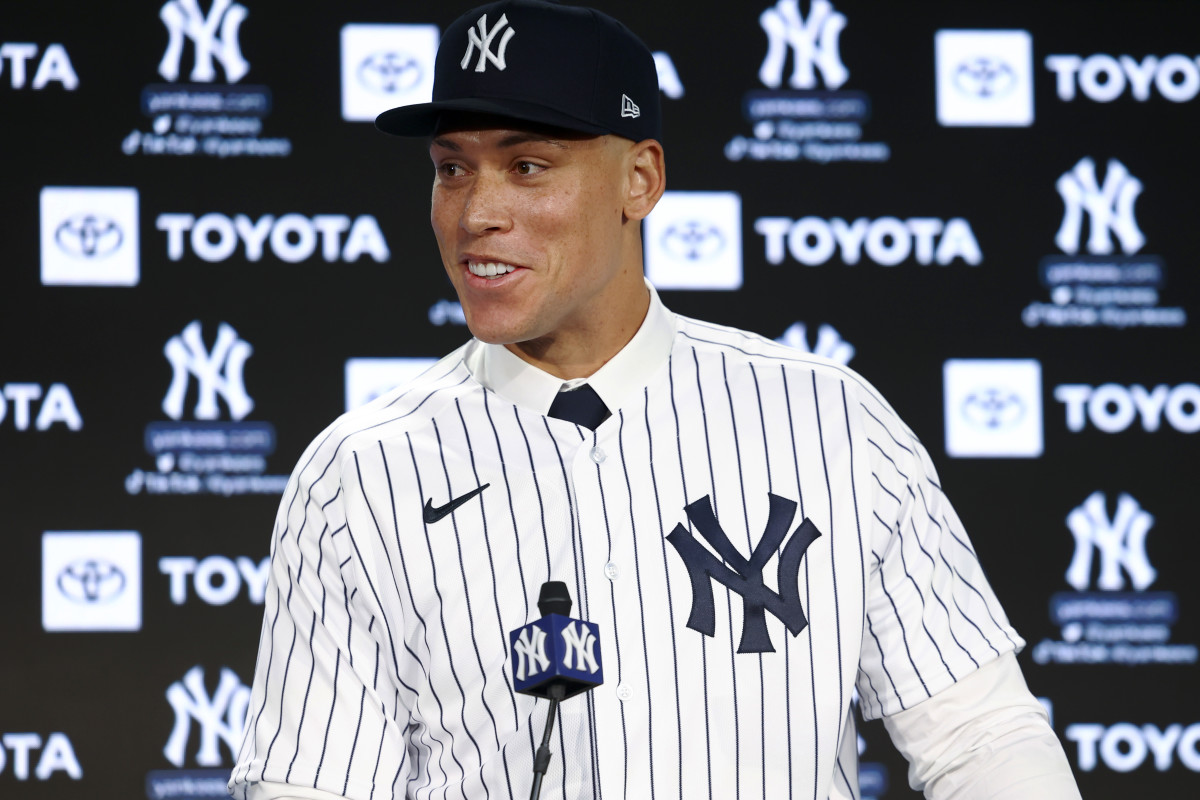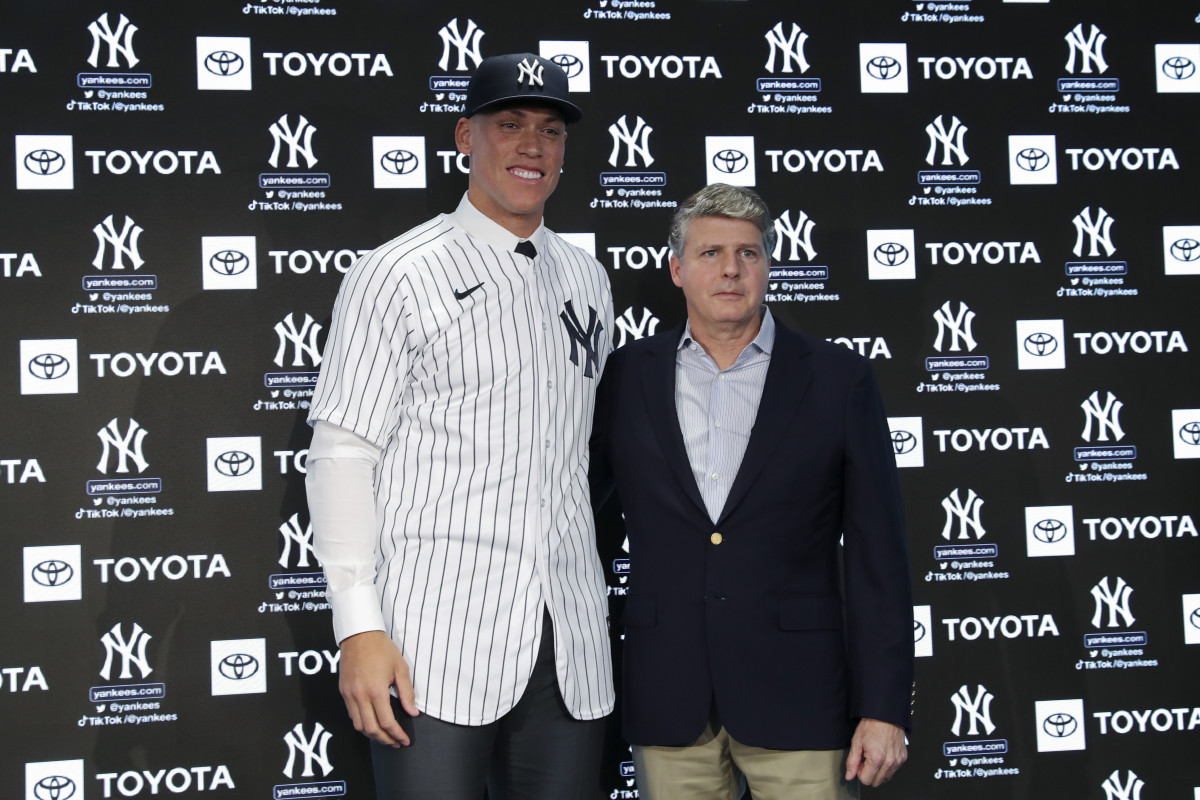Aaron Judge Never Planned on Leaving the Yankees

NEW YORK — In the future, ballplayers will speak of Aaron Judge’s 2022 in hushed tones: He set the American League home run record, with 62; he won the AL MVP award; he finished within five points of batting average of the Triple Crown. Player agents should extend the same awe to the year his representatives just had.
Judge’s longtime agent, Page Odle, runs a small shop called PSI Sports whose second-biggest client is probably Mariners second baseman Kolten Wong. But Odle understood from the beginning his player’s goal—“He wanted to be a Yankee,” Odle says. “If you get anything from me today, that is what he wanted”—and Odle helped set him up to achieve it.
In the end, Judge, whom the Yankees named captain on Wednesday during the press conference announcing his nine-year, $360 million contract, signed the largest free-agent deal in history because he played well. But he signed it with the Yankees because he played them well.
The Giants openly coveted Judge, who grew up 90 miles east of Oracle Park in Linden, Calif. They flew him to San Francisco the week of Thanksgiving; enlisted Golden State Warriors star Steph Curry to pitch him on the Bay Area; and included his childhood hero, longtime Giants shortstop Rich Aurilia, in the recruiting process.
That week, MLB Network released a video of Judge entering the lobby of a San Francisco hotel. Asked why he was in town, Judge smiled and said, “Just visiting some family and friends. That’s about it.” He winked.
Multiple reports have suggested that Judge staged the moment; “We had nothing to do with the video,” Odle insists. Likewise, he says, PSI was not responsible for reports that indicated Judge would fly to San Diego during the winter meetings to meet with teams. Regardless of who told whom what, Judge’s team did not mourn the publicity that surrounded his every move.
Nor did they bemoan the timing of a TIME story in which Judge was quoted complaining about GM Brian Cashman’s handling of a seven-year, $213.5 million extension offer the team made on the eve of the season. Cashman made public the terms of the deal Judge had rejected. “I was a little upset that the numbers came out,” Judge told TIME. “I understand it’s a negotiation tactic. Put pressure on me. Turn the fans against me, turn the media on me. That part of it I didn’t like.” The story ran online on Dec. 6, just hours before Judge landed in San Diego to meet with the Padres. He did not tell the Yankees he was coming, and he did not meet with them when he was in town.
The GM said earlier this month that he had told Odle beforehand that he would disclose the figures. Judge said on Wednesday that “there is a difference of memory” but that he and Cashman have mended fences. Odle declined to comment but did say, “He was forced into free agency at some level.”
In any event, Judge engaged his own negotiation tactics. Even as he told Odle as the process progressed that he was becoming more sure he wanted to remain a Yankee, he kept manager Aaron Boone guessing. Boone, who has managed Judge for five of the player’s six years in pinstripes, said it was “very” strange not to have a good handle on the emotions of someone he has known so well and for so long.
When an erroneous report stated on Dec. 6—the day of the TIME story and of the meeting with the Padres—that Judge had chosen the Giants, Boone believed it. He called the GM “in a panic,” Cashman said, and later called Judge to reiterate how much he meant to the team and to him personally.
“I think it got real for everybody,” Odle says. During the season, Cashman acknowledged, Judge had gone from a player the Yankees wanted to re-sign to one they could not lose. Odle knew that. He was concerned about a key sticking point: “There were no signs they were willing to go to nine years.”
But the Giants were, and suddenly the Padres were in the mix. Yankees owner Hal Steinbrenner was vacationing in Italy, and at 3 a.m. Pacific, he called Judge and asked what it would take. Judge asked for the ninth year. Steinbrenner agreed.
“That would’ve been a tough financial decision” if the Yankees had stayed at eight years, Judge said. He did not say whether he was prepared to make it. He never had to.

Asked on Wednesday if he believes the other teams were used as leverage or real destinations, Steinbrenner demurred. “Look, I don’t know what the other offers are, right?” he said. “I don’t know what’s on the table. I don’t know what he’s been promised. I don’t know, in the face-to-face meetings, what transpired, what he thought of their organization versus ours. I just didn’t know any of that.”
Says Odle, “He wanted to go through the process, but in his heart of hearts, he wanted to be a Yankee.” The benefit of listening to other presentations, he adds, was “to define his market. Because that was really the key. I think that’s why the Yankees waited so long. They really wanted to see if his market was, you know, what it was, and obviously it was.”
As he spoke, Judge strode by, wearing the only jersey he has ever worn, the only jersey he will ever wear. He smiled. He did not wink. He didn’t have to.
